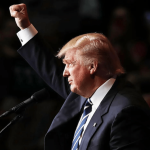Trump Weighs Invoking Rare Insurrection Act Amid US Unrest
President Donald Trump has stirred a storm by suggesting he may bring the Insurrection Act, an infrequently- used 1807 law granting the President wide-ranging powers to deploy military forces within the country.
Speaking to journalists on Monday, Trump indicated he could bypass legal and state-position obstacles to deploy National Guard units to metropolises such as Portland and Chicago.
“If people were being killed and courts or governors were holding us up,” Trump said, signalling a possible move that raises fresh questions about civil liberties and states’ rights.
What is the Insurrection Act?
The Insurrection Act of 1807 allows the chairman to mobilise active-duty service labor force or federalise National Guard units to quell rebellion, revolution, or significant civil unrest.
Unlike the Posse Comitatus Act, which limits military involvement in domestic law enforcement, this law provides a legal exception in extraordinary situations.
Typically, a president must issue a proclamation demanding that insurgents disperse. If the unrest continues, troops can then be deployed without prior congressional approval, giving the executive branch extensive discretion.
The law has been invoked sparingly. Presidents historically deployed it to enforce desegregation during the Civil Rights era, to suppress Detroit riots in 1967, and during the 1992 Los Angeles riots following the Rodney King verdict. It has not been used in over three decades.
Why is Trump threatening it now?
Trump’s renewed interest follows federal court blocks on his attempts to dispatch National Guard troops from Texas and California to Portland.
He insists ongoing disturbances in Portland and Chicago amount to “domestic terrorism” and criticises state officials for obstructing federal authority.
“If people were being killed and courts or governors were holding us up,” he told reporters, highlighting the urgency he perceives.
State leaders have reacted sharply. Illinois Governor JB Pritzker condemned the federal plan as “an unconstitutional invasion”, warning that Trump could be exploiting unrest to consolidate power.
California Governor Gavin Newsom even threatened to leave the National Governors Association if other states did not oppose the potential action.
Critics argue that Trump’s approach stretches the act beyond its historic scope. Legal experts caution that using it to circumvent judicial rulings risks undermining constitutional checks and balances.
Trump has yet to formally invoke the act, but frames it as a legal “workaround” to blockades from courts.
His administration has labelled judicial resistance a “legal insurrection,” setting the stage rhetorically. If enacted, it would likely trigger extensive lawsuits and political strife.
Implications for Civil Liberties
Should federal troops enter states without local consent, civil rights advocates warn of heightened tensions in already volatile cities.
Military involvement in domestic law enforcement could blur critical boundaries between civilian policing and armed force.
The Insurrection Act debate underscores a perennial clash in American governance: federal authority versus states’ rights.
Presidents hold emergency powers, yet history shows such powers are rarely exercised for a reason.
Whether Trump acts or not, the discussion illuminates profound divisions over law, order, and democracy in the United States.






